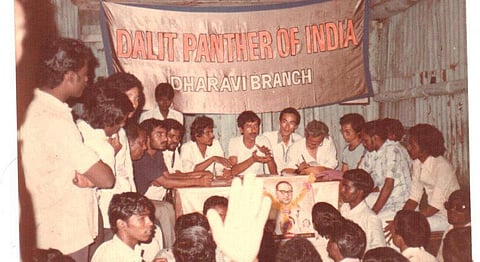
- HOMEGROWN WORLD
- #HGCREATORS
- #HGEXPLORE
- #HGVOICES
- #HGSHOP
- CAREERS
- ABOUT US
- CONTACT US

When my history class – a course boasting of a syllabus covering complete post-independence Indian history – taught us about the 1970s in India, there was a lot to talk about. India’s war with Pakistan, state-wide resistance in Punjab, border disputes in the northeast – and of course, the Emergency of 1977. We learnt about rebellion in the country, what it led to and how it is important to the communities to this day. And yet, when I came upon the Dalit Panthers later on, I was surprised to find that the history we learnt in an academic capacity skipped over one of the biggest resistance movements of the 70s: The Dalit Resistance.
The 1970s saw an increasing pattern in the oppression of the lower caste. If one were to think that freedom from the shackles of the British would have paved the way for internal unity in India, they would be very, very wrong.
Well into independence, Hindu feudalism had its roots planted firmly across the country. Indians who belonged to castes such as Mahar, Chamar, among other lower castes, were given jobs like collecting garbage or disposing of dead animals. In villages, there were still separate wells for the lower caste, which were often contaminated by the upper caste. There were frequent cases of caste-based violence, such as the Kilvenmani Massacre in Tamil Nadu – where 44 lower caste labourers were murdered for demanding higher wages.
In 1972, tired of the incessant oppression at the hands of Brahmanical Supremacy, J.V Pawar decided to take make a change. He was only a common man who happened to be from a lower caste, and also from Bombay, but he saw the need for a strike back. Along with his friend Namdev Dhasal, he decided to start an organisation that would challenge caste-based oppressors. They called themselves the “Dalit Panthers”. Having read about the U.S. Black Panthers in the Time Magazine, they designed their ideology on the same. In fact, it is the Dalit Panthers that made the term “Dalit” – a Marathi word for the downtrodden – popular. Joined by Raja Dhale and Arun Kamble, the Dalit Panthers took it upon themselves to combat oppression at the hands of upper castes, just like how the Black Panthers fought police brutality against the African-Americans.
The Dalit Panthers are an important part of the Dalit History because they stand out from most forms of Dalit resistance. Unlike the Ambedkaritan approach of non-violence that many Dalit leaders had adopted, the Dalit Panthers used threats, self defense and often violence to fight the atrocities. The Panthers were quite radical in their beliefs, too. For instance, in a speech delivered by Dhale at a conference, he criticised holy books of the Hindu religion, including the Vedas and asked for them to be burned down. As J.V. Pawar tells The Wire, the Panthers took it upon themselves to go up to the Sarpanch (usually an upper caste man) of the village where a Dalit atrocity has been committed and threatened him to reverse it. The Panthers didn’t leave without a written guarantee signed in the presence of a police. The interesting thing is that many members of the Dalit community called this behaviour “undemocratic” and condemned it – but the Dalit Panthers carried on.
There is a lot to criticise about how the Dalit Panthers functioned – be it their ideologies, the members or issues with execution of the manifesto. The Panthers were created out of the singular purpose of striking back – but eventually, it was tainted with a conflict in the ideologies of the members. While many were neo-Buddhists (former Dalits who converted to Buddhists), others were communists. The number of members increased – but at the same time, the group was unable to act on the promises that their manifesto boasted of. Resultantly, Dalit Panthers were disbanded in 1977.
Though the Panthers had a short life, their legacy remains alive even today. The Dalit Panthers questioned the very idea of independence. Demanded their independence. They laid the foundation for every resistance that was to come, reminding the community that they have a right to fight back and fight back with power. The collective history of movements of Dalit resistance has not found a home in our textbooks – but to this day, these movements are extremely important for the Dalit community.
If you enjoyed this article, we suggest you read:
